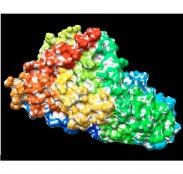Feed additives help agriculture and the environment

Researchers with the Agricultural Research Service (ARS) have designed feed supplements for poultry and other farm animals that not only boost nutrition, but also reduce the amount of potentially harmful phosphorus escaping into the environment.
ARS researchers Ed Mullaney and Jaffor Ullah have designed hard-working phytase enzymes that help chickens digest more of the phosphorus found in their plant-based diets.
While phosphorus is a necessary mineral that helps make up the DNA in all animals, excess phosphorus loads – in the form of manure – can contribute to pollution.
Unnaturally high levels of phosphorus seeping into rivers and oceans trigger massive algal blooms that steal oxygen from the water as they decompose. Depleted oxygen stores send shockwaves through marine ecosystems, causing large numbers of fish and other organisms to die off.
Twenty years ago, Mullaney and Ullah were the first to characterise a natural, fungal-based enzyme – called phytase – which could improve animal nutrition, save on feed costs and reduce phosphorus losses from farms. Mullaney, a geneticist, and Ullah, a biochemist, both work at the ARS Southern Regional Research Center in New Orleans.
Building on previous work, the scientists have now created new and improved enzymes specially suited for working in the stomachs of chickens and swine. They realised that phytase is an impressive catalyst for breaking down the tied-up phosphorus in animals’ plant-based diets, but its performance isn’t optimal in the microenvironments typical of many animal stomachs.
To get around this obstacle, the researchers made over the enzyme on a molecular scale. Its new look is making all the difference. In fact, Mullaney and collaborators discovered that swine fed the redesigned phytase additive for just five weeks gained 13 percent more weight than swine fed the original enzyme. And if the animals are absorbing more phosphorus, they are excreting less in their manure.
Read more about the research in the July 2006 issue of Agricultural Research magazine.
While phosphorus is a necessary mineral that helps make up the DNA in all animals, excess phosphorus loads – in the form of manure – can contribute to pollution.
Unnaturally high levels of phosphorus seeping into rivers and oceans trigger massive algal blooms that steal oxygen from the water as they decompose. Depleted oxygen stores send shockwaves through marine ecosystems, causing large numbers of fish and other organisms to die off.
Twenty years ago, Mullaney and Ullah were the first to characterise a natural, fungal-based enzyme – called phytase – which could improve animal nutrition, save on feed costs and reduce phosphorus losses from farms. Mullaney, a geneticist, and Ullah, a biochemist, both work at the ARS Southern Regional Research Center in New Orleans.
Building on previous work, the scientists have now created new and improved enzymes specially suited for working in the stomachs of chickens and swine. They realised that phytase is an impressive catalyst for breaking down the tied-up phosphorus in animals’ plant-based diets, but its performance isn’t optimal in the microenvironments typical of many animal stomachs.
To get around this obstacle, the researchers made over the enzyme on a molecular scale. Its new look is making all the difference. In fact, Mullaney and collaborators discovered that swine fed the redesigned phytase additive for just five weeks gained 13 percent more weight than swine fed the original enzyme. And if the animals are absorbing more phosphorus, they are excreting less in their manure.
Read more about the research in the July 2006 issue of Agricultural Research magazine.













